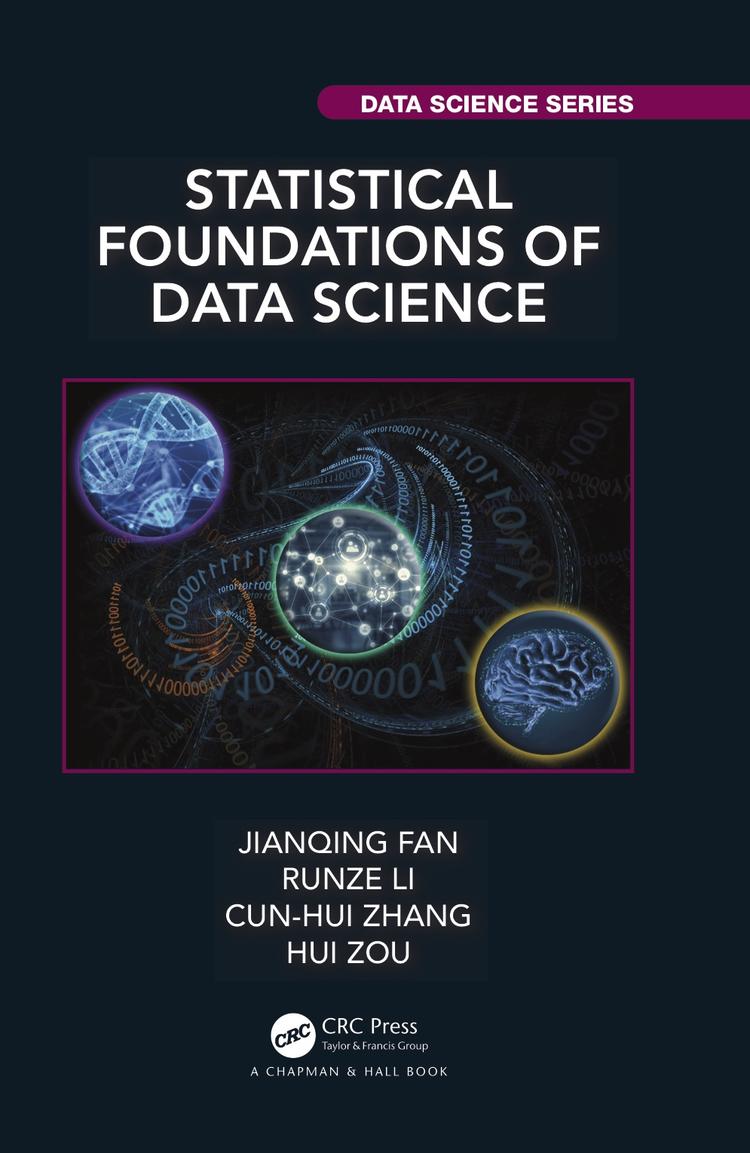Spring Semester, 2025
MW 3:00 pm - 4:20 pm
| Text Book | Details |
|---|---|

| Fan, J., Li, R., Zhang, C.-H., and Zou (2020). Statistical Foundations of Data Science. CRC Press. Homepage of the book To order the book from amazon.com or from CRC Press. |
General Information
Instructor: Jianqing Fan, Frederick L. Moore'18 Professor of Finance.
Office: 205 Sherred Hall
Phone: 258-7924
E-mail: [email protected]
Office Hours: Monday 2:00 pm--3:00 pm (205 Sherred), Tuesday 2:00pm--3:00pm (203b JRR, BCF), Wednesday 11:00am –- 12:00pm (203b JRR, BCF), or by appointments.
Precept: Arranged by the AI as needed
Assistants in Instruction (AIs):
- Sange Tang, [email protected], 258-8787, Office: 222 Sherred Hall
- Office Hours and Locations.
- Tuesday 3:00pm-4:00pm, Sherrerd Hall 123
- Thursday 2:00pm-3:00pm, Sherrerd Hall 123
- Office Hours and Locations.
- Financial Econometric Lab, 222 Sherred Hall, 258-9433
- Statistics Lab, 213 Sherred Hall, 258-8787
Text Book
- Fan, J., Li, R., Zhang, C.-H., and Zou, H. (2020). Statistical Foundations of Data Science. CRC Press.
- Lectures are primarily based on lecture notes taken from a textbook.
Reference Books
- James, G., Witten, D., Hastie, T.J., Tibshirani, R. and Friedman, J. (2013). An Introduction to Statistical Learning with Applications in R . Springer, New York.
- Hastie, T.J., Tibshirani, R. and Friedman, J. (2009). The Elements of Statistical Learning: Data Mining, Inference, and Prediction (2nd ed). Springer, New York.
- Buehlmann, P. and van de Geer, S. (2011). Statistics for High-Dimensional Data: Methods, Theory and Applications. Springer, New York.
- Hastie, T., Tibshirani, R., and Wainwright, M. (2015). Statistical learning with sparsity. CRC Press, New York.
- Wainwright, M. J. (2019). High-dimensional statistics: A non-asymptotic viewpoint. Cambridge University Press.
Syllabus
This course gives an in-depth introduction to statistics and machine learning theory, methods, and algorithms for data science. It covers multiple regression, kernel learning, sparse regression, sure screening, generalized linear models and quasi-likelihood, supervised and unsupervised learning, deep learning, covariance learning and factor models, principal component analysis, and other related topics such as community detection, item ranking, topic modeling, and matrix completion. The applicability and limitations of these methods will be illustrated using mathematical statistics, a variety of modern real-world data sets, and manipulation of the statistical software R.
Course material will cover the following topics; some will be assigned as reading materials.
- Rise of Big Data and Dimensionality*
- Impact of Big Data;
- Impact of Dimensionality
- Aims of High-dimensional statistical learning
- Aims of Big Data
- Chapters 1--3
- Multiple and Nonparametric Regression
- Multiple Linear Regression
- Model Building and Basis Expansions
- Ridge Regression
- Reproducing Kernel Regression
- Assigned Reading, Lecture Notes 1, Homework 1
- Penalized Least Squares
- Best subset and L_0 penalty
- Folded-concave Penalized Least Squares
- Lasso and L_1-regularization
- Numerical Algorithms
- Regularization parameters
- Refitted Cross-validation
- Extensions to Nonparametric Modeling
- Lecture Notes 2, Homework 2
- Generalized Linear Models and Penalized Likelihood
- Generalized Linear Models
- Variable Selection via Penalized Likelihood
- Numerical Algorithms
- Statistical Properties
- Feature Screening
- Correlation Screening
- Generalized and Rank Correlation Screening
- Nonparametric Screening
- Sure Screening and False Selection
- Supervised Learning
- Model-based Classifiers
- Kernel Density Classifiers and Naive Bayes
- Nearest Neighbor Classifiers
- Classification Trees and Ensemble Classifiers
- Support Vector Machine
- Sparsier classifiers
- Sparse Discriminant Analysis
- Sparse Additive Classifiers
- Unsupervised Learning
- Cluster Analysis
- Variable Selection in Clustering
- Choice of Number of Clusters
- Sparse PCA
- Introduction to Deep Learning
- CNNs and RNNs
- Transformers
- Generative adversary networks
- Training Algorithms
- A Glimpse of Theory
- Covariance Regularization and Graphical Models
- Sparse Covariance Matrix Estimation
- Robust Covariance Inputs
- Sparse Precision Matrix and Graphical Models
- Latent Gaussian Graphical Models
- Covariance Learning and Factor Models
- Principal Component Analysis
- Factor Models and Structured Covariance Learning
- Covariance and Precision Learning with Known Factors
- Augmented Factor Models and Projected PCA
- Asymptotic Properties
- Applications of PCA and Factor Models
- Factor-adjusted Regularized Model Selection
- Factor-adjusted Robust Multiple Testing
- Augmented Factor Regression
- Applications to Statistical Machine Learning
Computation
The software package for this class is R or RStudio. See R-labs below. Most of the computation in this class can be done through a laptop. Laptops with wireless communication turned off can be used during exams, and so are the calculators.
Attendance
Attendance of the class is required and essential. The course materials are mainly from the notes. Many conceptual issues and statistical thinking are only taught in the class. They will appear in the midterm and final exams.
Homework
Problems will be assigned through Canvas approximately biweekly and submitted online. No late homework will be accepted. Missed homework will receive a grade of zero. The homework will be graded, and each assignment carries equal weight. You are allowed to work with other students on the homework problems; however, verbatim copying of homework is absolutely forbidden. Therefore, each student must ultimately produce his or her own homework to be handed in and graded.
Exams
There will be one in-class midterm exam and a final exam. All exams are required, and there will be no make-up exams. Missed exams will receive a grade of zero. All exams are open-book and open-notes. Laptops with wireless off and calculators may be used during the exams.
Schedules and Grading Policy
| Assignment | Schedule |
|---|---|
| Homework (25%) | Various due dates (approx 5 sets) |
| Midterm Exam (25%) | Wednesday, March 19, 2025 (3:00pm--4:20pm, in class) |
| Final Exam (50%) | 9:30am--12:30pm, Friday, May 2, 2025 in Room 101, Sherred Hall |
R-labs
The following files intend to help you become familiar with the use of R-lab commands.
Here are some useful materials, too.
- An Introduction to R, by W. N. Venables, D. M. Smith, and the R Core Team.
- U-Tube video: An introduction to R
- Labs 1-5: Basic skills and their associated data set (Boston housing data)
- The following extended skills are not used in the class but are provided here for convenience.
- Extended Skills: ANOVA and their associated data set (labor data).
- Extended Skills: GLIM and their associated data set (burn data). Description of the data set
- The following extended skills are not used in the class but are provided here for convenience.
- Lab 6: Linear time series analysis
- Lab 7: Discrete volatility models
- Lab 8: Capital Asset Pricing Model
Data Sets used in the class
- Zillow House Price Prediction: training data
- Zillow test data, Source, and Details
- Monthly Macroeconomics Data, Source, and Details
- Transformed Macroeconomics Data, Details of transformation, and Meanings of variable
- Autism Data, Expressions of top 5 differently expressed genes and other variables
- Neuroblastoma Data, Gene expressions of 246 neuroblastoma patients and an indicator of whether a patient has a 3-year event-free survival
- mice protein expression data (preprocessed)
- Image Data: 500 photos with people in the pictures and 500 photos without people in the pictures and its associated R-code to preprocess the data human.r
- Yields of SP500 and more
- Expenditure and Personal Expenditure and Other Macroeconomics Data

